How to grow cucumbers vertically – simple methods for successful crops
Discover how to make the most of your space by learning how to grow cucumbers vertically

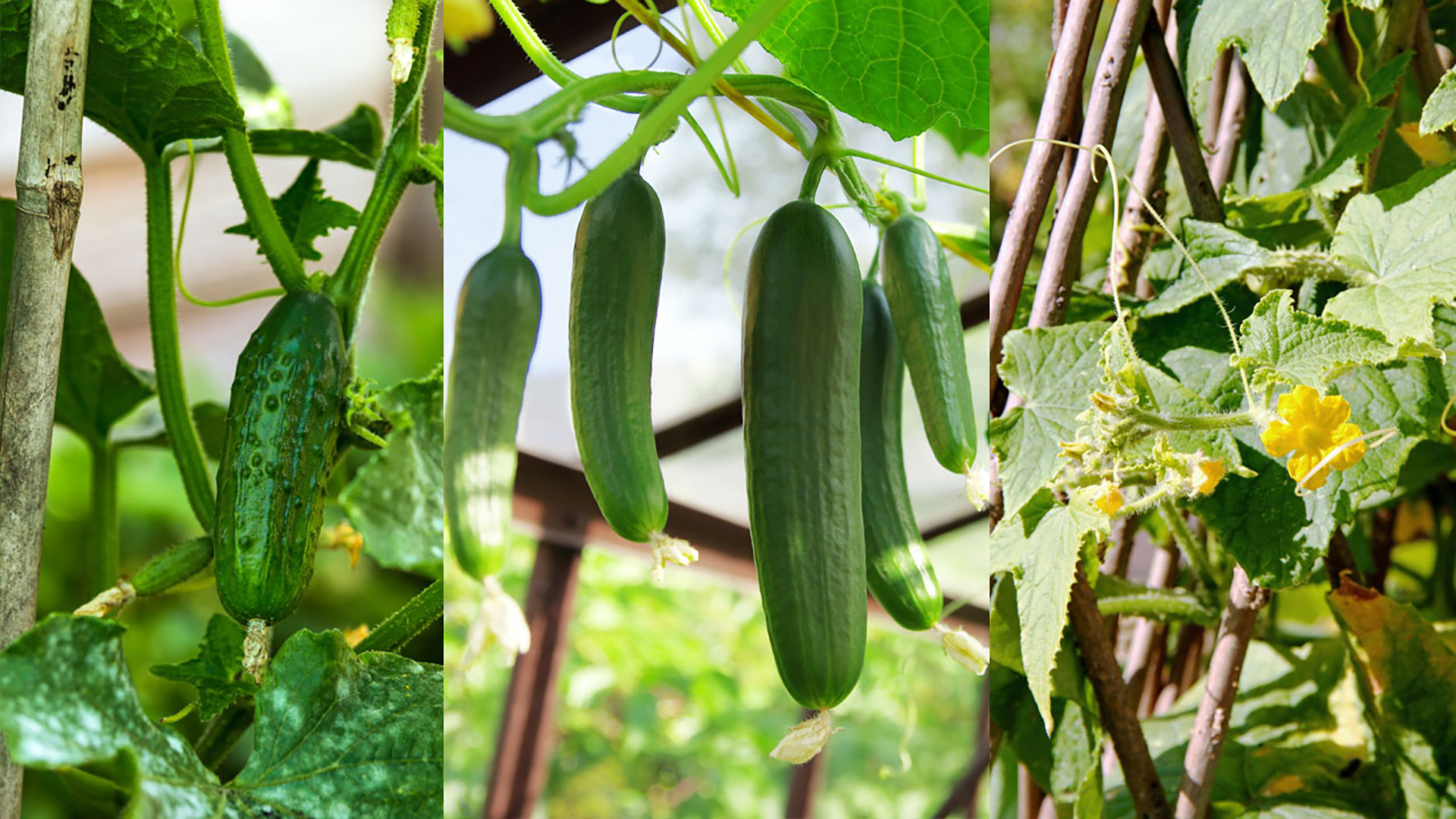
Design expertise in your inbox – from inspiring decorating ideas and beautiful celebrity homes to practical gardening advice and shopping round-ups.
You are now subscribed
Your newsletter sign-up was successful
Want to add more newsletters?

Twice a week
Homes&Gardens
The ultimate interior design resource from the world's leading experts - discover inspiring decorating ideas, color scheming know-how, garden inspiration and shopping expertise.

Once a week
In The Loop from Next In Design
Members of the Next in Design Circle will receive In the Loop, our weekly email filled with trade news, names to know and spotlight moments. Together we’re building a brighter design future.

Twice a week
Cucina
Whether you’re passionate about hosting exquisite dinners, experimenting with culinary trends, or perfecting your kitchen's design with timeless elegance and innovative functionality, this newsletter is here to inspire
Learning how to grow cucumbers vertically can be a valuable addition to your kitchen garden skills, providing a bumper crop of this salad favorite right through the summer.
Of course, before you start figuring out how to grow cucumbers vertically, you'll need to research how to grow cucumbers to ensure that you give your crop the best start in life.
One of the easiest vegetables to grow, they are a great addition to vegetable gardens.

How to grow cucumbers vertically
Before we get to the 'how', we need to tackle the 'where' to ensure you have the right growing conditions for growing cucumbers vertically.
1. Find a spot with the right conditions
When deciding how to grow cucumbers vertically, it is important that you pick a spot with minimal wind as this will make your pergola or trellis more sturdy and will also help the cucumber plant to thrive. Pick a sunny area and ensure that the soil is well-drained, loose and deep.
There is a whole host of vertical gardening ideas that can be used to grow cucumbers vertically, from a living wall and vegetable garden trellis to pergolas and arches:
- Pergola A great addition over a patio and when mixed with other climbers can also provide shade.
- Trellis Traditional method for growing cucumbers vertically.
- Teepee Compact way to grow cucumbers vertically, can work in a greenhouse and containers as well as outdoors.
- Arches An aesthetic choice but need to ensure that they are sturdy before training plants.
- A-frame Provides a very stable structure on which to grow cucumbers, however it does take up a lot of space so is best suited for larger plots and vegetable gardens.

Drew is a former professional gardener who specialized in growing fruit and vegetables. He was a kitchen gardener in several productive walled gardens in the UK and has grown a variety of cucumbers for many years, both for chefs and also to sell to the public.
Drew Swainston, former kitchen gardener and Content Editor for Homes & Gardens, adds that cucumbers can be trained to grow vertically up a string or cane, just like tomato plants.
Design expertise in your inbox – from inspiring decorating ideas and beautiful celebrity homes to practical gardening advice and shopping round-ups.
'This can either be done outdoors on purpose-built frames or in a greenhouse, where wires can be stretched from one side to the other. I have even done it in a polytunnel and connected the strings to the central frame of the structure,' he says.
'Secure the string to the frame or wire at one end and firmly wrap the other end of the string around the plant’s root ball when planting. Make sure to pull the string tight and bury it well in the planting hole, firming it in to ensure it is taut. As the plant grows, regularly wind it around the string and it will remain supported.'
2. Sow the cucumber seeds
When growing from seed, the method is the same regardless of the structure you choose. Start by sowing seeds in small pots and then cover with soil.
3. Plant out the cucumbers
Once they have germinated and grown their true leaves, plant in their final location. You can grow cucumbers in pots, raised beds, grow bags, or in the ground. It is also vital you wait until all risk of frost has passed before you plant out your cucumber seedlings. Once planted out, mulch with organic matter as cucumber plants need very fertile soil.
4. Tie in cucumbers to grow them vertically
Once your cucumbers have started to put on height, tie onto the pergola or trellis and continue to do this as they grow. It is also important that you know how to prune cucumber plants as this will keep the vines under control.
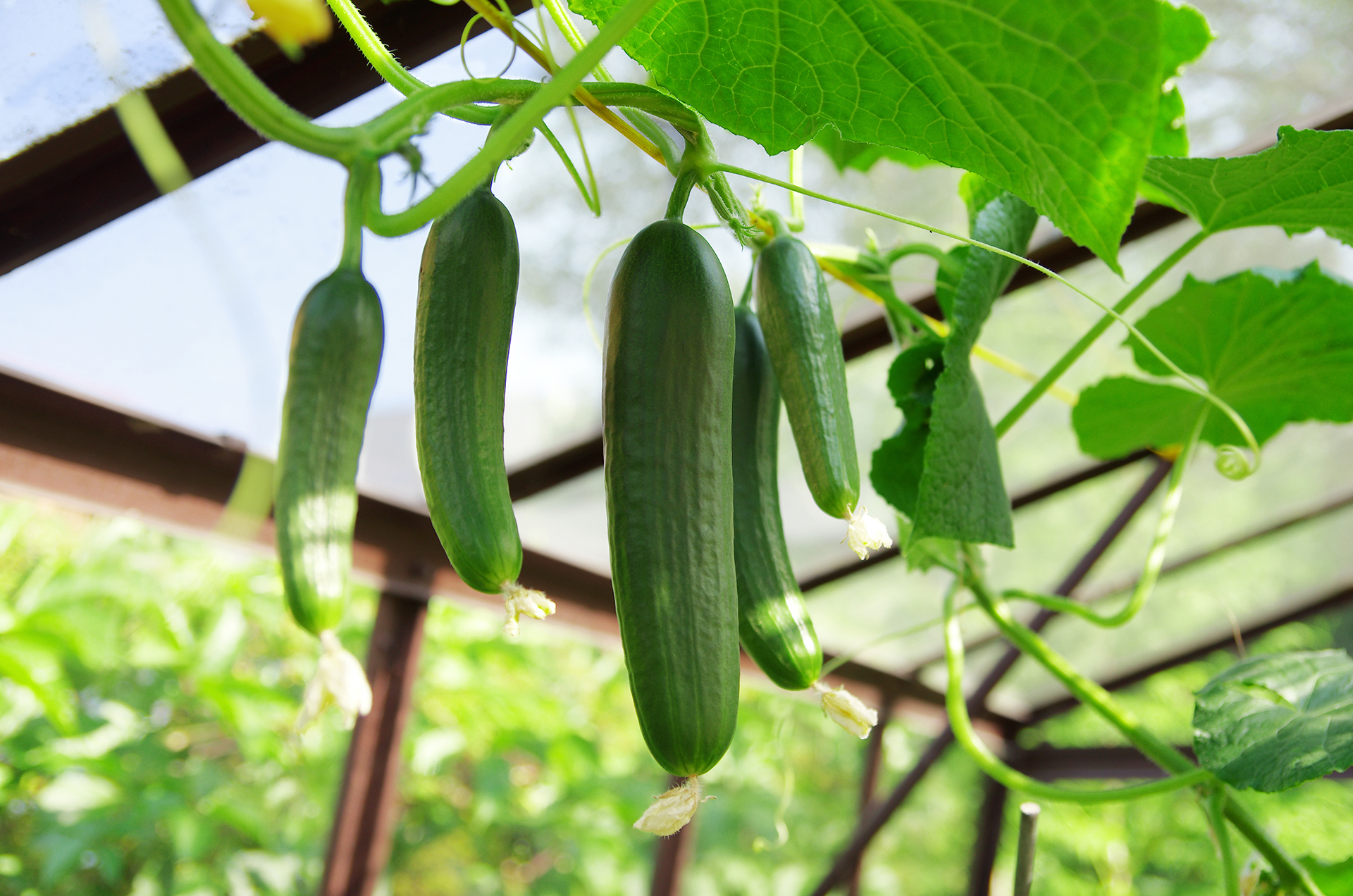
What are the benefits of growing cucumbers vertically?
There are lots of benefits to growing cucumbers vertically, the biggest being yield: ‘One cucumber vine can produce three times the yield compared to those grown horizontally,’ says Lindsey Hyland, founder of UrbanOrganic Yield. 'Plus, you'll also save on your garden's water consumption since the plant's roots are confined to a much smaller surface area.’
Cucumbers are natural climbers and, if unsupported, will sprawl across the ground. However, if grown at ground level, the plant is more vulnerable to rot, diseases and pests. Growing cucumbers vertically reduces the likelihood of your plant succumbing to rot and disease, since it improves the air circulation. The fruit is also less likely to rot before harvesting as it is not resting on the ground where the moisture from the soil will encourage decay. Plus, as the fruit is hanging it is less likely to be eaten by rabbits, slugs, snails or other ground foraging animals.
Since the fruit can occupy a larger space than it can on the ground, it will also result in straighter cucumbers and a more aesthetically pleasing crop. 'The cucumbers that are grown vertically will also be cleaner and have fewer blemishes as well as being more uniform in growth and maturity,' explains Lindsey.
Growing different plants together vertically can make a world of difference to their health and productivity and this is even easier when growing vertically. There are lots of great ideas to try in relation to cucumber companion planting which will all help you get the biggest and tastiest homegrown crop.
How to grow cucumbers vertically on a trellis
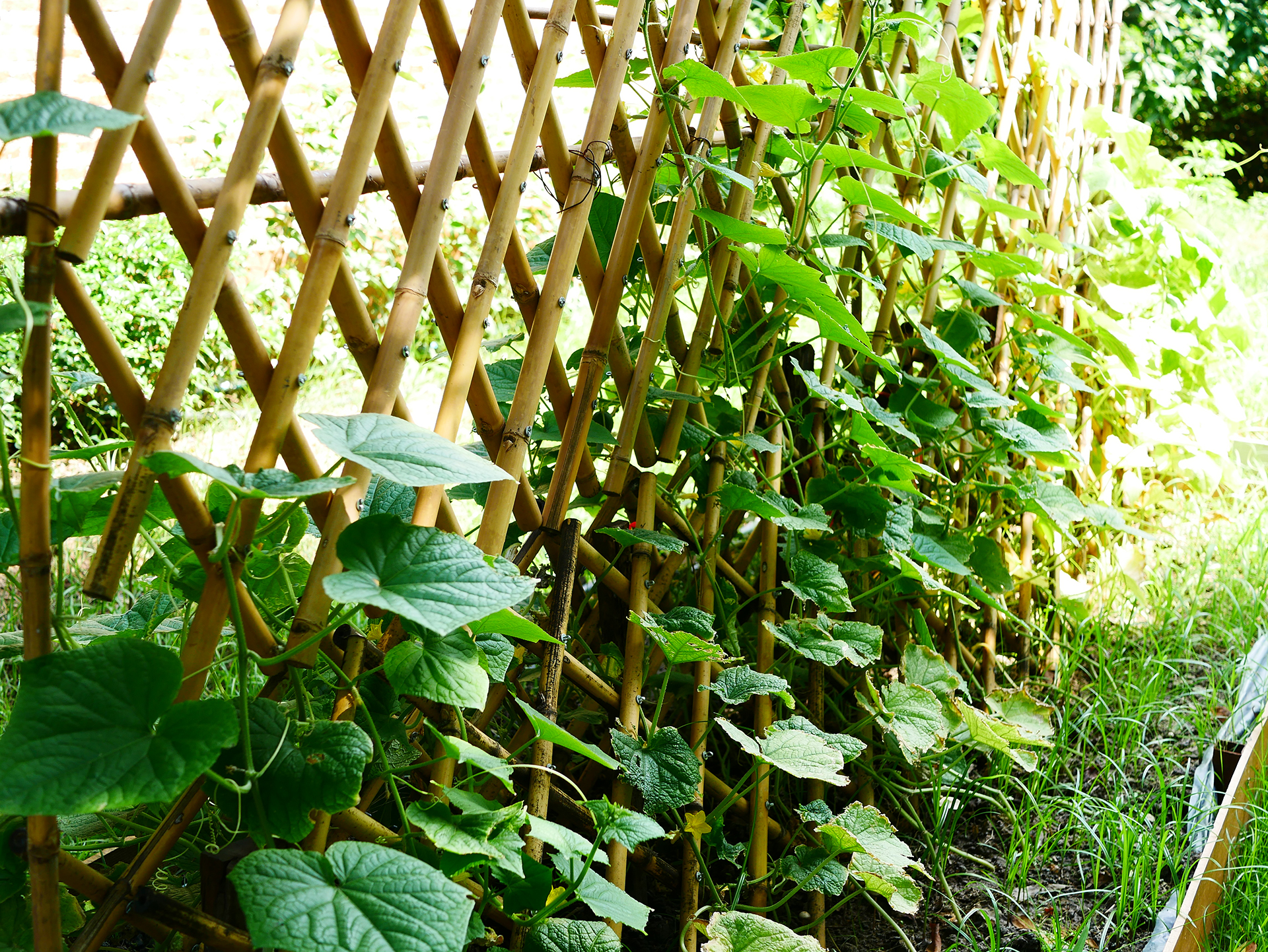
When choosing a trellis for growing cucumbers, you'll need to find a trellis that is between 5 and 7 feet tall and be sure you have secured it into the ground or raised bed. This method works for both flat trellises and A-frame trellises.
Before you plant your courgette plants into the ground, first assemble your trellis. This could range from attaching a wooden trellis to a fence to securing your A-frame trellis in a bed.
Having done this you are now ready to plant out your cucumber plants. Position them at regular intervals along your trellis or A-frame, leaving at least 12 inches between each plant. Then loosely tie the plants to sections of the trellis with garden twine. Continue doing this as your cucumber plant grows as it will encourage it to grow vertically.
How to grow cucumbers vertically on a pergola
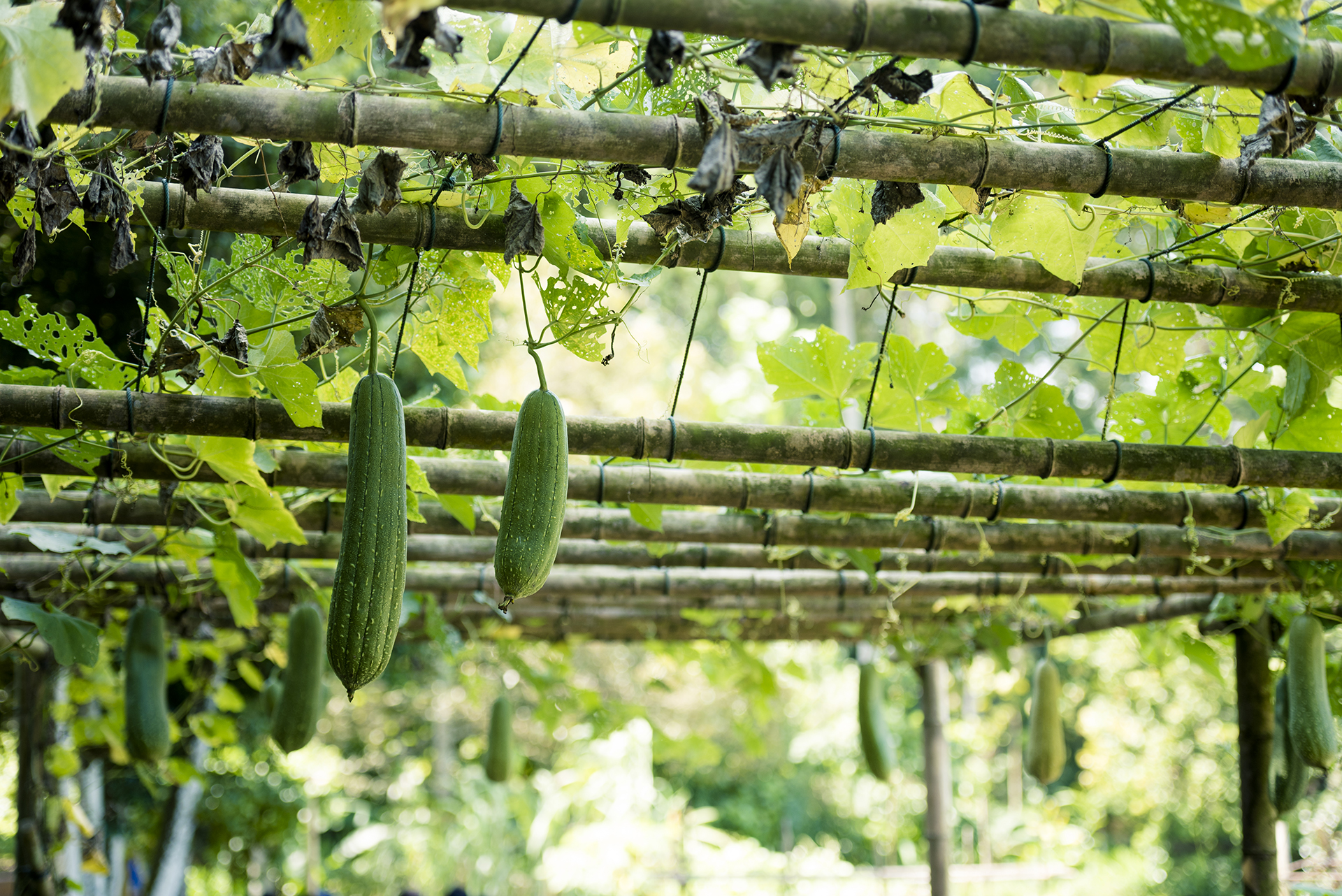
Another way to grow cucumbers vertically is to train them over a pergola. The method for growing cucumbers on a pergola is very similar to growing cucumbers vertically on a trellis. Growing cucumbers vertically on a pergola offers one of the easiest ways of harvesting as the cucumber fruit will hang down from the roof of the pergola.
Start by planting your cucumber plants at the foot and secure with garden twine. Then as they grow, continue tying them to the pergola, slowly guiding them up and over to create a roof. When ripe, simply snip the connecting stem above the fruit and you've got a delicious addition to your sandwich or salad.
How to grow cucumbers vertically in a container garden
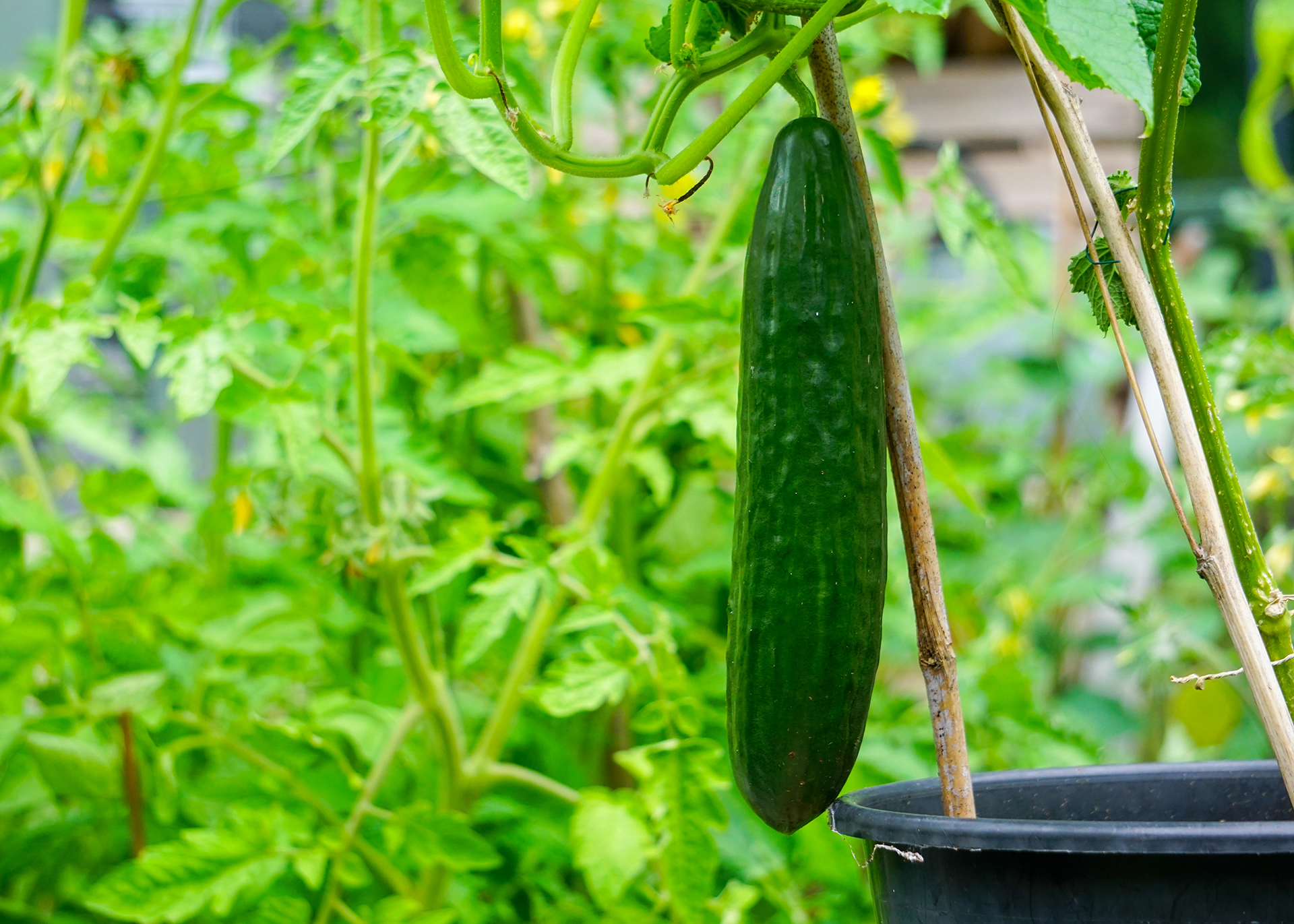
There are plenty of vegetable garden container ideas to inspire you to grow fruits and vegetables in your plot. For growing cucumbers vertically in a container garden, your best option is to use a wigwam structure to support the plant. Make sure you have selected a large pot, one that holds at least 5 gallons of compost.
'Take three or four canes, around six foot tall, and place them around the cucumber plant, about 30cm apart' says Mark Greenhalgh, gardener at Hayes Garden World, 'then take a piece of string and tie the tops of the canes together.'
Once you have created the basic cone-like structure, you then need to attach your plant to the support. 'Take another piece of string and loosely around the plant and the cane. This will encourage them to grow up it,' says Mark.
As the plant continues to grow, keep loosely tying the new parts of the plant to the cane to guide it up the support. It is vital that you tie the plant loosely so that it doesn't create a wound on the cucumber plant that can invite infection or disease.
This method can also be used in garden beds, raised beds or in the greenhouse.
FAQs
Do you need to support fruit when grown vertically?
One of the challenges that come from growing cucumbers vertically is that the cucumber fruits can become too heavy for the vine. In order to support them, you can create fabric slings to cradle the cucumber fruits and then tie them onto the trellis. Be sure to leave enough space that your cucumber can continue to grow.
How much space do you need to grow cucumbers vertically?
You only need one or two square feet of space to grow cucumbers vertically. This is compared to the 10 to 20 square feet that is needed to grow cucumbers horizontally. As well as the ground space, you will also need between four and six feet of trellis, pergola or canes to support your cucumber plants as they grow vertically.
Can you use tomato cages for cucumbers?
Yes, you can use tomato cages for growing cucumbers vertically. However, cucumbers need between four and six feet of vertical height in order to grow successfully. Therefore, if you are planning to use tomato cages for your cucumbers it is important to check that they are tall enough, otherwise you might need to join two together to provide the necessary height.

Having graduated with a first class degree in English Literature, Holly started her career as a features writer and sub-editor at Period Living magazine, Homes & Gardens' sister title. Working on Period Living brought with it insight into the complexities of owning and caring for period homes, from interior decorating through to choosing the right windows and the challenges of extending. This has led to a passion for traditional interiors, particularly the country-look. Writing for the Homes & Gardens website as a content editor, alongside regular features for Period Living and Country Homes & Interiors magazines, has enabled her to broaden her writing to incorporate her interests in gardening, wildlife and nature.